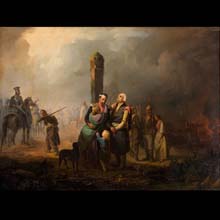
material: oil on canvas
dimensions: 92 x 123 cm
description: In September 1831, after the final collapse of the November Uprising, while retreating from the surroundings of Warsaw, Polish units crossed the border at Brodnica in Pomerania and were interned. The main forces of the defeated Polish army, which found shelter in the officially neutral Prussia, had around 20 thousand people. Some of them returned to the country still in the same year, after Tsar Nicholas I had declared an amnesty for soldiers and non-commissioned officers. Others went into exile. The painting with extended narration symbolically shows the last moments of fighting and leaving the country by the defeated insurrectionary detachments. The painting depicts two soldiers parting with their families, a wounded noble officer visible near a border post in the centre, and a peasant soldier further in the background. On the right, in the battle fire and smoke, we can see a few soldiers who are still fighting, and on the left, there are units of cavalry and infantry retreating into the misty space. Light and darkness divide the painting into two parts, thus emphasizing its metaphorical significance. Wacława Milewska
exposition: The Gallery of 19th Century Polish Art in Sukiennice,
The Cloth Hall, 1, Main Market Square
key: Romanticism. Towards national art >>>
dimensions: 92 x 123 cm
description: In September 1831, after the final collapse of the November Uprising, while retreating from the surroundings of Warsaw, Polish units crossed the border at Brodnica in Pomerania and were interned. The main forces of the defeated Polish army, which found shelter in the officially neutral Prussia, had around 20 thousand people. Some of them returned to the country still in the same year, after Tsar Nicholas I had declared an amnesty for soldiers and non-commissioned officers. Others went into exile. The painting with extended narration symbolically shows the last moments of fighting and leaving the country by the defeated insurrectionary detachments. The painting depicts two soldiers parting with their families, a wounded noble officer visible near a border post in the centre, and a peasant soldier further in the background. On the right, in the battle fire and smoke, we can see a few soldiers who are still fighting, and on the left, there are units of cavalry and infantry retreating into the misty space. Light and darkness divide the painting into two parts, thus emphasizing its metaphorical significance. Wacława Milewska
exposition: The Gallery of 19th Century Polish Art in Sukiennice,
The Cloth Hall, 1, Main Market Square
key: Romanticism. Towards national art >>>












